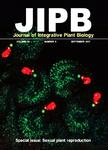Cellulose synthesis genes CESA6 and CSI1 are important for salt stress tolerance in Arabidopsis
Cellulose synthesis genes CESA6 and CSI1 are important for salt stress tolerance in Arabidopsis作者机构:State Key Laboratory of Genetic Engineering Collaborative Innovation Center of Genetics and Development School of Life Sciences Fudan University Department of Biostatistics and Computational BiologySchool of Life Sciences Fudan University
出 版 物:《Journal of Integrative Plant Biology》 (植物学报(英文版))
年 卷 期:2016年第58卷第7期
页 面:623-626页
核心收录:
学科分类:0710[理学-生物学] 09[农学] 0903[农学-农业资源与环境] 0901[农学-作物学] 0703[理学-化学] 0902[农学-园艺学]
基 金:financially supported by grants from the National Basic Research Program of China (973 Program, 2012CB910500) the National Natural Science Foundation of China (numbers 31222008 and 31470353)
摘 要:Soil salinity is a widespread abiotic stress constraint threatening agricultural production, as it severely inhibits growth and development of crops. Several salt stress signaling pathways have been discovered in the model plant Arabidopsis thaliana, which include components for sensing the stress, transmitting the signal and regulating the downstream genes (Deinlein et al. 2o14; Julkowska and Testerink 2015). In nature, plant roots directly encounter heterogeneous soils and therefore their responses to saline environments require dynamic changes in growth, a process in which plant cell walls play important roles (Tenhaken 2o15). However, the molecular mechanisms underlying cell wall remodeling under stress conditions are still unclear.



